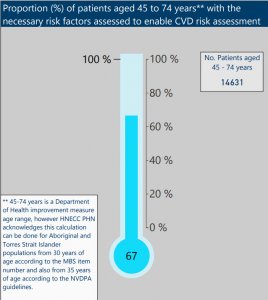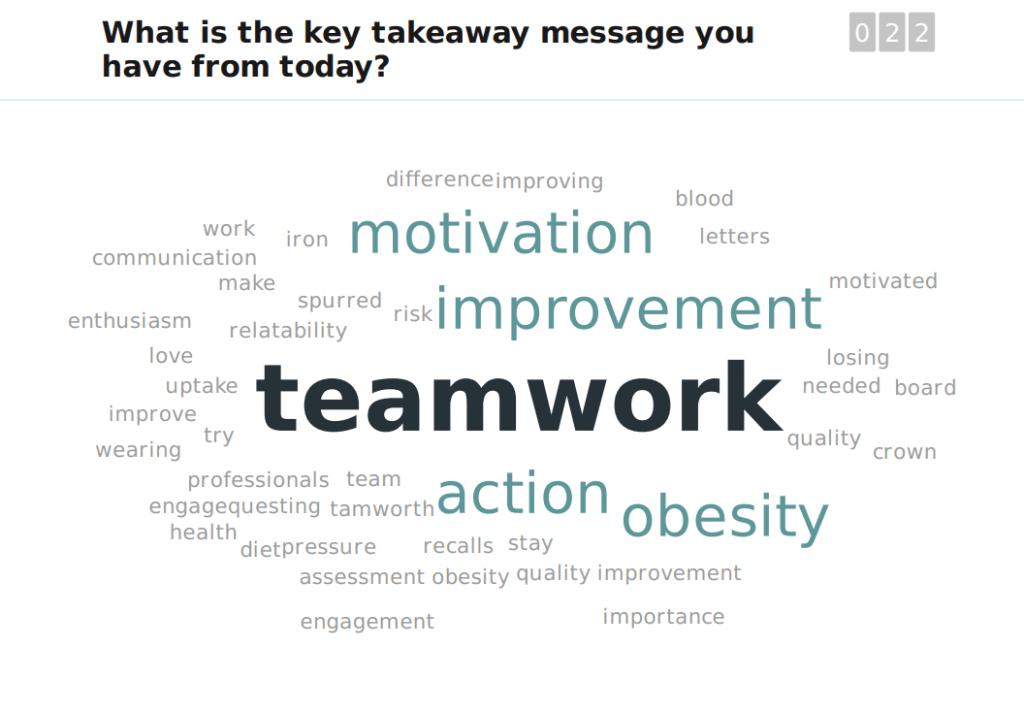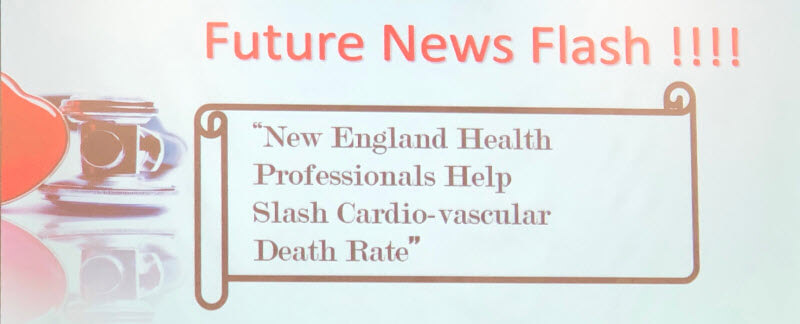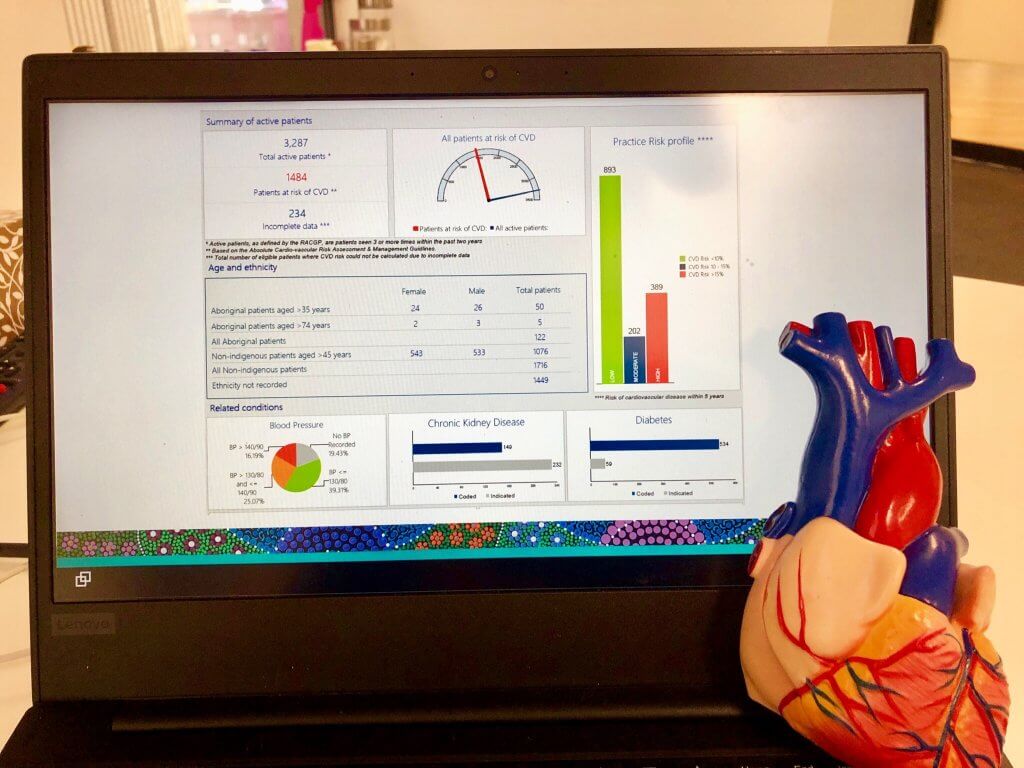Tamworth, September 2019:
I was picked up at Tamworth airport and driven to my hotel by a professional driver, a lovely guy, aged probably in his early 30’s. We chatted and he asked me why I was visiting his town. When I told him Hunter New England has the highest incidence of preventable deaths from heart disease in NSW and myself and many health professionals were all there to work together to try to change that – to ‘Save 2000 Hearts’ – he began to share some of his personal health story with me.
He told me he and his wife both need to lose about 30 kilos each, that he smokes, that he is disappointed because his wife did so well and actually managed to give up smoking for two years but has just taken it up again. He told me how she quit and why she started again. He shared with me that he attends Tamworth Aboriginal Medical Service only when he needs a new prescription and he told me he usually sees a different doctor every time he attends the clinic. He told me this is extremely frustrating because he has to tell his story over and over again and also because every new doctor then spends the whole time questioning him about his medication regime for his chronic back condition and wants to try something new. He told me he knows what works for him and that he only takes his pain medication about once a week when he has been sitting too much and his pain is severe and he has found this to be the only thing that relieves his pain and allows him to sleep. He also shared that he and a lot of his Tamworth friends are “trying a new diet pill called Keto which makes you lose weight without needing to exercise”. He told me exercise is hard for him because he has a chronic back condition which is exacerbated by the fact he sits and drives all day.
I think about this nice guy and I think about preventable illness, his risk factors. I think about his personal, unique story and I wonder how much of his story his health professionals know. How much of his story is able to be shared in a 10-15 minute GP consultation once or twice a year?
I felt very worried for this lovely guy as I automatically ticked those CVD risk factors in my head – smoking, weight, aboriginality, exercise, stress. I wondered about diabetes, family history of heart disease, alcohol and I want to help this lovely guy who really wants to help himself and his family. Here was a really interested, friendly guy really wanting to lose weight, wanting to exercise, wanting to care for his family and keep them well, wanting to engage with a regular health care provider.
None of this is easy. Everyone is trying. We are only with our patients for a short time. How do we connect?
How do we deliver the best possible care?
Care teams
Among the 77 people who attended the Save 2000 Hearts symposium were:
General Practitioners
Cardiologist
Aboriginal Health workers
Registered Nurses
Practice Nurses
Cardiac Clinical Nurse Consultant, Local Health District
Exercise physiologist
Pharmacist
Podiatrists
Physiotherapists
Practice managers
GP Registrars
Research students
Clinical teaching and research university academics
Primary Health Network support staff
Rural Doctors of NSW support staff
Shoutout to Annabelle Williams from Hunter New England Primary Health Network who is an absolute community team-building, event-organising superstar!
Quest Leaders
Dr Tony Lembke (who I admire so much I have to try not to be embarrassing) made us smile as he MC’d the day and taught us how to ‘Lead a Quest’. If anyone knows how to lead improvements (and win Donkey Kong) it is Dr Lembke.
With Cate Ferry from the National Heart Foundation and the Hunter New England Primary Health Network team we talked partnering and engagement. They launched CVD Tool Kits and programs for prevention – see reading and resources list below. You might also want to check out our new Train IT Medical PIP QI page with free resources.
“It’s a long game” was the mantra but the commitment to change the headlines is real. We are with you for the long game Hunter New England!
Tamworth GP Dr David Lockhart and RN Tammy Hall from Barton Lane Practice and Reakeeta Smallwood (RN, Lighthouse Project) were true local inspirations as they shared strategies and learnings.
And Tamworth seems to have won the lottery this month with Cardiologist Dr Michael McGee moving to town. Talk about a legend – Dr McGee managed to not only have 77 health professionals glued to his every word but he managed to get us on the floor and test how many push-ups we could do in a minute during his presentation. “What’s your BMI?” he asked us. What examples are we setting for our patients? Take the prize Dr McGee.
Watch my 40 second video with highlights of the day.
United Health Professionals
Different health professional perspectives opened our eyes to a more co-ordinated team care approach with new possibilities.
Well respected local physiotherapist & rural clinical council member, Warren Ansell, explained he often has more time to chat to patients than the doctors and can reinforce key messages. He called for improved co-ordination of care and communication. Actually I think everyone at the event did.
We heard how pharmacists are our “patient’s most accessible health professional” given their pharmacies are open long hours every day of the week. We heard of many missed “easy opportunities” when it comes to prevention and of the many benefits for our patients with a more co-ordinated teamcare approach.
Kim Poyner from Medicoach was an absolute star on the day, teaching us all the wonderful benefits to be gained if we improve our health coaching skills and think differently about nurse-led clinics within our practices.
United Educators
Dr Tony Lembke, Kim Poyner and I spent many hours together that day and another fabulous team was born. We thought the symposium was so beneficial, the skills of leadership, health coaching and better utilisation of medical software and data so important and relevant to all of us in health that we want to bring the education to the rest of Australia. We will be offering both a virtual conference and in-person event so stay tuned for more on that. We would love you to join us at the “innovation end of the spectrum”.
What’s data got to do with it?
 It was data that told us Hunter New England has significantly more preventable deaths, nearly the largest aboriginal population in Australia and of the benefits of statins for heart health.
It was data that told us Hunter New England has significantly more preventable deaths, nearly the largest aboriginal population in Australia and of the benefits of statins for heart health.
In my two presentations I talked about ”Using your practice software for cardiovascular management’ as well as ”Business Modelling & Practice Sustainability’. Web-abridged versions of my presentations are free to download and share here.
With the goal of improving engagement and keeping people well firmly in mind, I aim to help improve your:
- Proactive preventive health reminder system
- Reactive recall management system
- Quality coded clinical data collection with electronic shared care planning.
- Electronic communication for clinical handover
“Be aggressive with risk factors, the seeds of cardiovascular disease are sown young”. Dr Michael McGee.
We need to enter risk factors into our software in order for our technology to help us identify patients at risk and track how we are managing them. Your PHN can provide the reports you see in my pics and presentations and help with data improvements.
If you work in a practice and did not receive my guide to CVD using Bp Premier or MedicalDirector Clinical Software or need help with software training please contact us. If you have new staff or GP registrars, ask us for our CVD GP consultation checklist.
Key messages

Person-centred team care is the key to success!
We all know someone who has been affected by heart disease. This is obviously an area of improvement relevant to us all.
Many presenters at ‘Save 2000 Hearts’ were emotional, telling stories of someone they lost too soon.
I told a story of success because I have witnessed the life-saving significant difference that proactive systematic preventive health care can make. I have a patient and practice success story I will share in my next blog. Thanks for reading and let’s work together to re-write the headline:

With best wishes, Katrina Otto
Further learning:
Absolute Cardiovascular Disease Risk Assessment Toolkit
Smoking Cessation in General Practice Toolkit
Ideas for improving recording of height, weight, alcohol and ethnicity
Webinar – Heart Foundation Absolute risk – a practical update
Heart Foundation launches new Tamworth heart health ambassador program.
Tamworth continues to lead in overweight, obesity figures
Tamworth health workers plan forum to tackle cardiovascular related deaths

